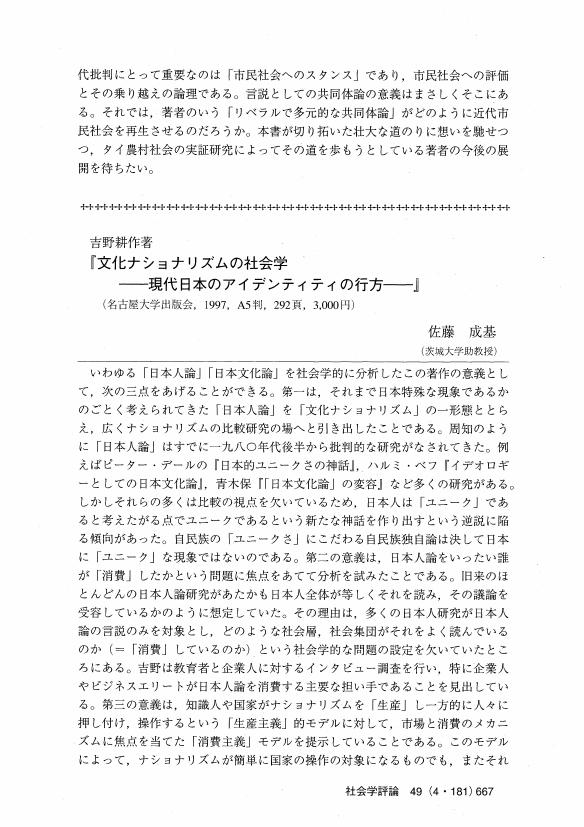5 0 0 0 OA 国民国家と移民の統合
- 著者
- 佐藤 成基
- 出版者
- 日本社会学会
- 雑誌
- 社会学評論 (ISSN:00215414)
- 巻号頁・発行日
- vol.60, no.3, pp.348-363, 2009-12-31 (Released:2012-03-01)
- 参考文献数
- 53
- 被引用文献数
- 1
1990年代以後,欧米先進諸国の移民統合政策が変化してきている.それまでの「デニズンシップ」や「多文化主義」に傾斜した政策が後退し,「統合」という概念により重点が置かれるようになっている.それは一見,「グローバル化」時代のトレンドと矛盾するように見える.本稿は,このような最近の変化を,19世紀以来の国民国家形成とグローバルな移民の拡大との歴史的な連関関係のなかで考察してみる.国民国家は,19世紀以来200年間のグローバルな変容のなかで形成/再形成され,またグローバルに波及してきた.そのようななかで国民国家は,移民を包摂・排除しながらその制度とアイデンティティを構築してきた.本稿は,その歴史的過程を明らかにしたうえで,最近の欧米先進諸国の「市民的」な移民統合政策への変化が,「異質」なエスノ文化的背景をもった移民系住民を包摂するかたちで国民国家を再編成しようとする,新たな「ネーション・ビルディング」への模索であるということを主張する.最後に,こうした最近の欧米先進諸国における変化から日本の状況を簡単に検討する.
5 0 0 0 OA グローバル化のなかの右翼ポピュリズム : ドイツAfDの事例を中心に
- 著者
- 佐藤 成基
- 出版者
- 法政大学社会学部学会
- 雑誌
- 社会志林 = Hosei journal of sociology and social sciences (ISSN:13445952)
- 巻号頁・発行日
- vol.65, no.2, pp.95-115, 2018-09
5 0 0 0 IR 文化社会学の課題--社会の文化理論にむけて
- 著者
- 佐藤 成基
- 出版者
- 法政大学社会学部学会
- 雑誌
- 社会志林 (ISSN:13445952)
- 巻号頁・発行日
- vol.56, no.4, pp.93-126, 2010-03
4 0 0 0 OA ナショナリズムとファシズム 歴史社会学的考察
- 著者
- 佐藤 成基
- 出版者
- 社会学研究会
- 雑誌
- ソシオロジ (ISSN:05841380)
- 巻号頁・発行日
- vol.46, no.3, pp.37-53,224, 2002-02-28 (Released:2016-11-02)
This paper attempts to explore the relationships between nationalism and fascism in historical contexts. Nationalism is political action seeking to represent the "wills " and "interests" of the "nation" as a political (imagined) community, also regarded as "us" or "a people." Forms of nationalism historically vary. Fascism could be regarded as a form of nationalism, which first emerged in Europe under the impacts of the First World War. This "total war" brought about dramatic changes in the relationships between "state" and "society": while the state expanded their ruling functions and came to penetrate civilian lives more deeply, various political groups in society began to claim more actively their interests to the state. State and society were thus "democratized." As a result of these changes, nationalism turned from an official, top-down movement, which had still been dominant in the prewar period, into a popular mass movement seeking to mobilize the "nation" as a whole. The First World War also transformed the idea of nationalism: strong solidarity under the "total mobilization" and "fraternity" in trenches were idealized as symbols of the nation. The idea of the nation came to be associated with the memory of the experiences of national solidarity during the war. "Front soldiers" coming back from the battlefields became active bearers of nationalism and developed militant "paramilitary" movements. Moreover, the idea of "national self-determination," which was officially recognized by world leaders as a principle of international politics in the Paris Conference, raised the moral and political legitimacy of nationalism, although the Versailles settlement could never fully realize this ideal and even engendered resentments in some "nations." All these changes contributed to the rise of the popularity and the intensity of nationalism in the postwar period, which fascism was able to utilize to gain mass support.
- 著者
- 佐藤 成基
- 出版者
- 法政大学社会学部学会
- 雑誌
- 社会志林 = Hosei journal of sociology and social sciences (ISSN:13445952)
- 巻号頁・発行日
- vol.64, no.1, pp.21-48, 2017-07
2 0 0 0 OA 国民国家とは何か
- 著者
- 佐藤 成基
- 出版者
- 茨城大學政経學會
- 雑誌
- 茨城大學政経學會雑誌 (ISSN:02865734)
- 巻号頁・発行日
- no.74, pp.27-43, 2004-03-10
2 0 0 0 IR グローバル化のなかの右翼ポピュリズム : ドイツAfDの事例を中心に
- 著者
- 佐藤 成基
- 出版者
- 法政大学社会学部学会
- 雑誌
- 社会志林 (ISSN:13445952)
- 巻号頁・発行日
- vol.65, no.2, pp.95-115, 2018-09
- 著者
- 佐藤 成基
- 出版者
- 法政大学社会学部学会
- 雑誌
- 社会志林 (ISSN:13445952)
- 巻号頁・発行日
- vol.63, no.4, pp.59-97, 2017-03
2 0 0 0 OA 「統合の国」ドイツの統合論争 : 変化するドイツ社会の自己理解
- 著者
- 佐藤 成基
- 出版者
- 法政大学社会学部学会
- 雑誌
- 社会志林 = Hosei journal of sociology and social sciences (ISSN:13445952)
- 巻号頁・発行日
- vol.57, no.4, pp.173-205, 2011-03
2 0 0 0 IR 書評と紹介 新倉貴仁著『「能率」の共同体 : 近代日本のミドルクラスとナショナリズム』
- 著者
- 佐藤 成基
- 出版者
- 法政大学大原社会問題研究所
- 雑誌
- 大原社会問題研究所雑誌 = The journal of Ohara Institute for Social Research (ISSN:09129421)
- 巻号頁・発行日
- no.714, pp.65-70, 2018-04
2 0 0 0 OA 「血統共同体」からの決別 : ドイツの国籍法改正と政治的公共圏
- 著者
- 佐藤 成基
- 出版者
- 法政大学社会学部学会
- 雑誌
- 社会志林 = 社会志林 (ISSN:13445952)
- 巻号頁・発行日
- vol.55, no.4, pp.73-111, 2009-03
2 0 0 0 IR 「統合の国」ドイツの統合論争--変化するドイツ社会の自己理解 (宮島喬教授退職記念号)
- 著者
- 佐藤 成基
- 出版者
- 法政大学社会学部学会
- 雑誌
- 社会志林 (ISSN:13445952)
- 巻号頁・発行日
- vol.57, no.4, pp.173-205, 2011-03
2 0 0 0 IR 国境を越える「民族」--アウスジードラー問題の歴史的経緯
- 著者
- 佐藤 成基 Sato Shigeki
- 出版者
- 法政大学社会学部学会
- 雑誌
- 社会志林 (ISSN:13445952)
- 巻号頁・発行日
- vol.54, no.1, pp.19-49, 2007-07
2 0 0 0 OA 国民国家とは何か
- 著者
- 佐藤 成基
- 出版者
- 茨城大學政経學會
- 雑誌
- 茨城大学政経学会雑誌 (ISSN:02865734)
- 巻号頁・発行日
- no.74, pp.27-43, 2004-03
2 0 0 0 OA 昔農英明著『「移民国家ドイツ」の難民庇護政策』
- 著者
- 佐藤 成基
- 出版者
- 日本社会学会
- 雑誌
- 社会学評論 (ISSN:00215414)
- 巻号頁・発行日
- vol.66, no.2, pp.335-336, 2015 (Released:2016-09-30)
1 0 0 0 OA 吉野耕作著『文化ナショナリズムの社会学-現代日本のアイデンティティの行方-』
- 著者
- 佐藤 成基
- 出版者
- 日本社会学会
- 雑誌
- 社会学評論 (ISSN:00215414)
- 巻号頁・発行日
- vol.49, no.4, pp.667-669, 1999-03-30 (Released:2010-11-19)
1 0 0 0 OA 国境を越える「民族」 : アウスジードラー問題の歴史的経緯
- 著者
- 佐藤 成基
- 出版者
- 法政大学社会学部学会
- 雑誌
- 社会志林 = Hosei journal of sociology and social sciences (ISSN:13445952)
- 巻号頁・発行日
- vol.54, no.1, pp.19-49, 2007-07
1 0 0 0 OA ヴァイマル共和政期のドイツの国籍 : 国籍の「エスニック化」とその限界
- 著者
- 佐藤 成基
- 出版者
- 法政大学社会学部学会
- 雑誌
- 社会志林 = Hosei journal of sociology and social sciences (ISSN:13445952)
- 巻号頁・発行日
- vol.69, no.3, pp.31-64, 2022-12
1 0 0 0 OA 文化社会学の課題 : 社会の文化理論にむけて
- 著者
- 佐藤 成基
- 出版者
- 法政大学社会学部学会
- 雑誌
- 社会志林 = Hosei journal of sociology and social sciences (ISSN:13445952)
- 巻号頁・発行日
- vol.56, no.4, pp.93-126, 2010-03
- 著者
- 佐藤 成基
- 出版者
- 法政大学社会学部学会
- 雑誌
- 社会志林 (ISSN:13445952)
- 巻号頁・発行日
- vol.64, no.1, pp.21-48, 2017-07

